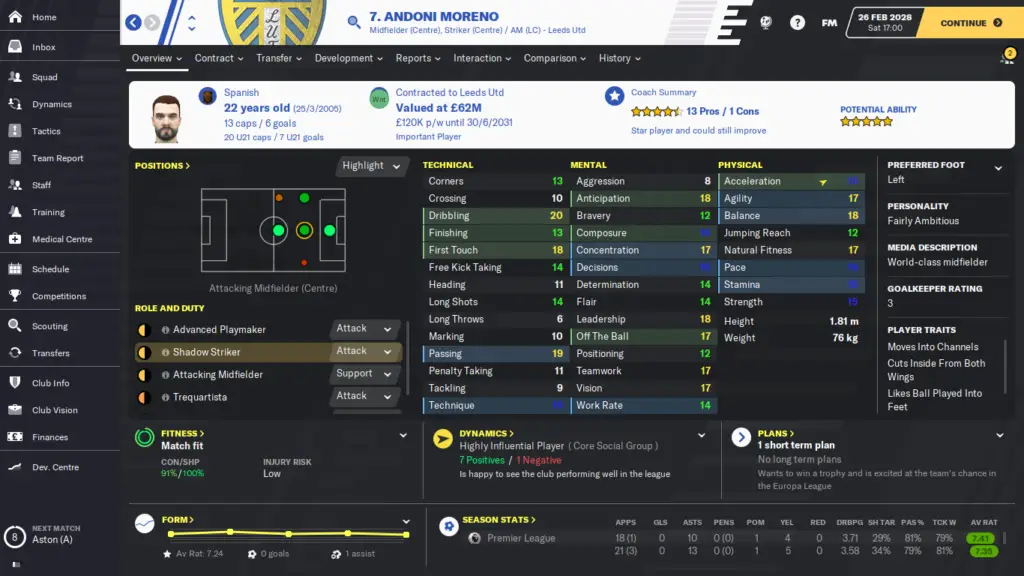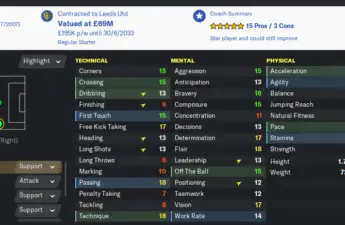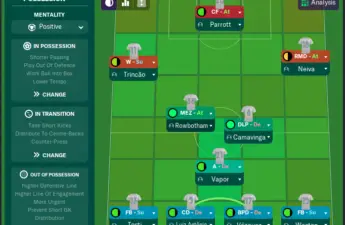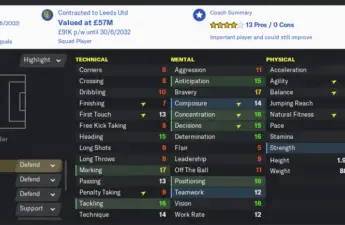Choosing the right player on football manager to lead your club to the Champions League title or bravely fight relegation might seem like a menial task compared to coming up with a treble winning tactic, but it affects your team in ways you might not expect.
Having the right captain could be the difference between your team seeing out a 1- 0 lead in a fierce derby, or giving up two late goals, which can potentially start a downward spiral of your team losing morale and in turn performing poorly on the pitch.
You might think you only need to look at the leadership attribute rating and pick the highest, which isn’t necessarily the worst way in the world in going about it, but a captain is a leader both on and off the pitch, and you want him to represent you and the club in the best light possible.

A media friendly player despite having a high leadership rating should not be selected as captain as he will run to the media every time he is at logger heads with you due to matters such as having his play time reduced or his friend being transfer listed.
I have thus prepared this guide to aid you in picking the right player to lead your dressing room in your FM saves;
Factors to Consider When Picking a Captain on FM
Time Spent at the Club
Football Manager is a simulation game, and I try as much as possible to stick with what is feasible in the real world. Assigning captain duties to the longest serving player is what clubs like Real Madrid do and is effective as players are more likely to listen to someone who has seen it all in the club, both the highs and the lows.
A long serving player is also likely to have the club listed as one of his favourites. Therefore, you would not have to worry about the captain kicking up a fuss wanting to leave for greener pastures.
I can not think of a situation where giving the arm band to a new signing would be a good decision, even though he has all the qualities necessary. His influence in the squad will be too low for him to have any control over the other team members.
Age of the Player
We all know the success stories of Cesc Fabregas and Fernando Torres, who were made captains at very young ages and thrived off the pressure. But these are very much the outliers, and the majority of young players will buckle under the pressure of shouldering the team’s responsibility at such young ages.
The mental attributes, which are key in successful captains, usually develop fully towards the tail end of players’ careers, therefore youngsters are more likely to be lacking in this sector.
Furthermore, young players are unlikely to be in the team leaders or highly influential positions in the club’s hierarchy introduced in fm18, and having a non-influential person in captain duties is a recipe for disaster.
Unhappy players will be more willing to voice their issues, causing the squad’s morale to take a hit in the process, and the captain would not be able to have any control over the unfolding mess.
Position of the Player in the Club’s Hierarchy
As already pointed out, make sure your captain is at least a highly influential player or a team leader. Players will be more willing to follow the example of a player who already commands a degree of respect in the squad.
Those in the ‘Influential’ and ‘Others’ position in the hierarchy won’t really have the impact you are expecting from your captain.
Which Social Group he Belongs in
Social groups as the name implies are made up of players who get along with each other and will more often than back each other up when one of them is unhappy. Upsetting one of them is a sure way of setting up a chain reaction, causing half of your squad to be unhappy or concerned.
Players in one social group will have similar levels of professionalism, might speak the same language, and will have also spent similar amount of time at the club.
Always pick a captain in the core group or in the first secondary social group as he will have a bigger influence on more players present in his social group rather than picking a loner who won’t have any influence over anyone.
Leadership Rating of the Captain
A high leadership rating will make players perform their captain duties more effectively on the pitch, whether it is encouraging teammates to rally together for a comeback or holding on for dear life when being bombarded by the opposition in the dying moments of the game.
The advantages also extend to the dressing room when you request the captain to perform ambassadorial duties like asking an unhappy player to drop his concerns, a player wanting to leave the club to rethink his decision or mediating between two players who don’t get along.
A high leadership rating is complemented by high determination, professionalism and aggression.
Player Personality and Media Handling Style
A player’s personality alongside his media handling style will determine his day-to-day handling of things. Model citizens or model professionals are the gold standards, while resolute, professionals and leaders are still good candidates. Captains with time will become influential members of the team and them having the best personalities will be invaluable to your youth players as they stand to benefit through tutoring and getting the good traits crucial for optimal development.
Other Players Opinion
Before settling on a player as a captain, check whether he is popular in the squad on another player’s profile. You are looking for whether other players think your preferred candidate is an “inspired leader”. Seeing this on a few players profile is enough to conclude the candidate will do a fine job in the role.
Avoid captaining players who do not get along with the majority of the squad, most likely due to different levels of professionalism, then prioritize on getting rid of those with low professionalism unless they are excellent in what they do and therefore irreplaceable.
Coach’s Report
A good place to gain insight on a player is the report from a coach. Check whether the player is recognized as a team player or a natural-born leader. These two traits will make sure your captain gives his all in the pitch and will be on the front line taking charge when things don’t go as planned in a match.
Selfish players as identified by the coach are best left alone to do their own thing. I would only have a selfish player as an attacker, but not in the central midfield positions where teamwork is crucial.
Bonus Factors To Consider When Picking a Captain in Football Manager
If you are not looking to necessarily pick the best possible candidate for the captain role in football manager, and also ready to suffer the consequences once in a while. You can consider picking him on the following guidelines.
- The Club’s Hometown Hero – What’s better than the local lad leading his boyhood club from the lower divisions to a Champions League win?
- Best Academy Product – You can give the arm band to the best academy product your youth system has produced. He doesn’t have to start each game, as long as you keep him around as a rotational member of the team.
- The Club’s Marquee Signing – You have already broken the bank to land that five star rated striker or defender, why not give him the armband in the process and watch him lead your club to the promised land.
- Your Regen Son – If in the manager’s profile you are above 35 years of age, there is a slim chance your in game football manager son might come through the youth system. Why not give him the arm band to have father and son leading the team in different capacities?



2 thoughts on “Choosing A Captain In Football Manager, 8 Factors to Consider”
Comments are closed.